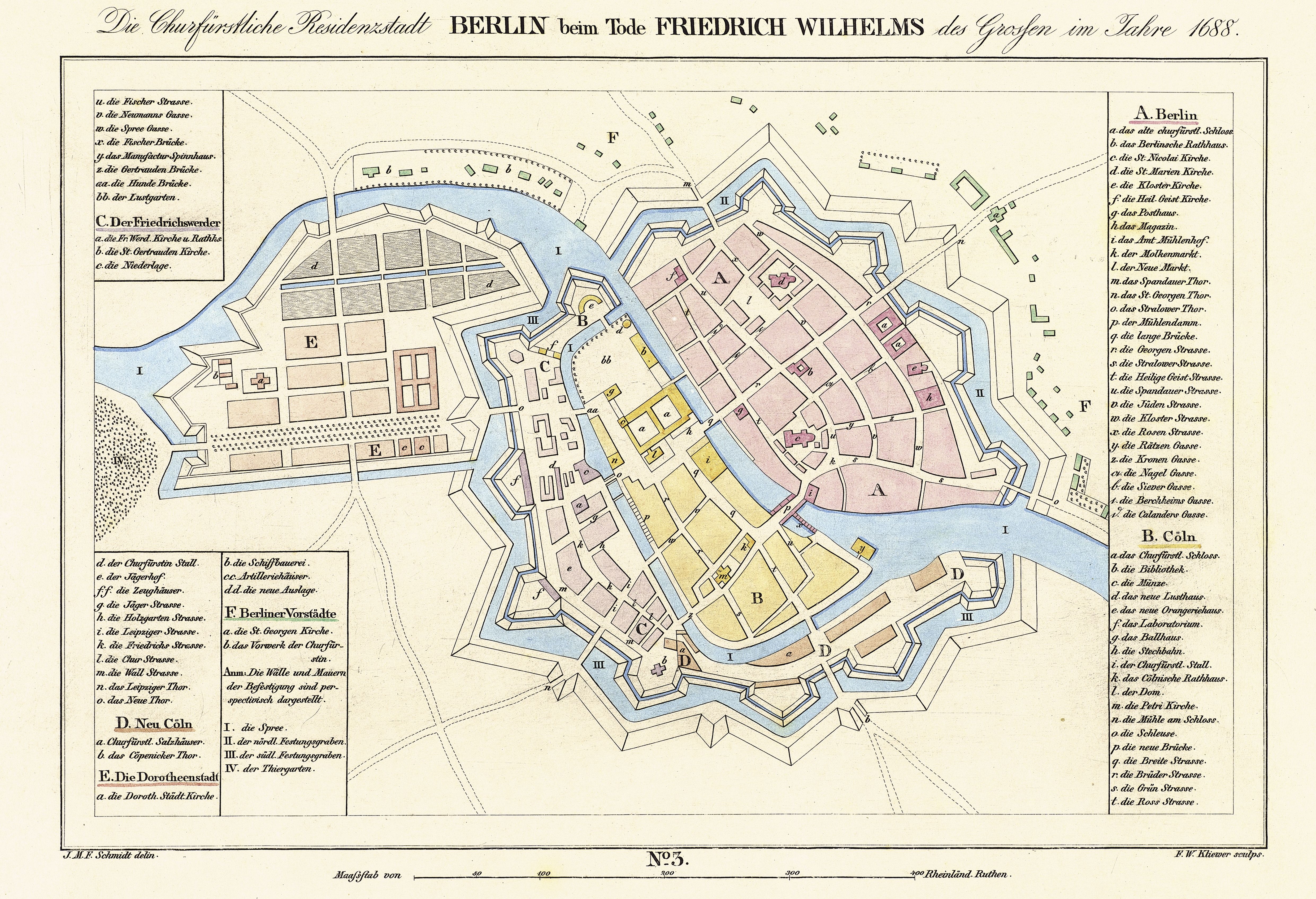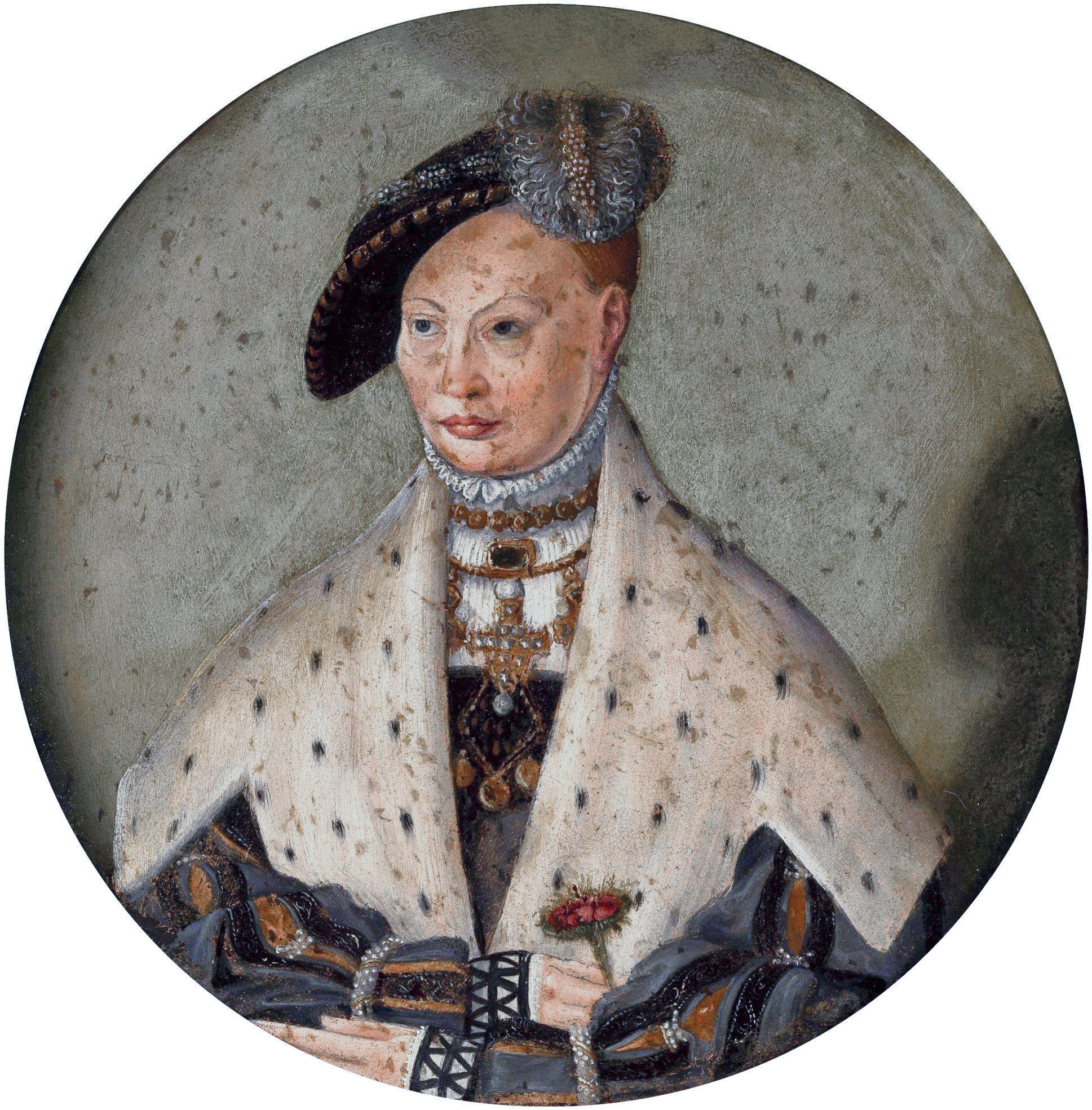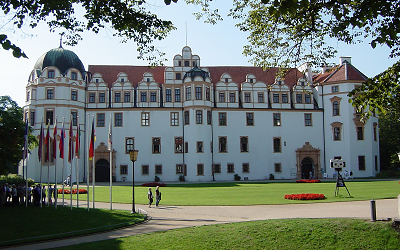|
Princess Dorothea Sophie Of Schleswig-Holstein-Sonderburg-Glücksburg
Princess Dorothea of Schleswig-Holstein-Sonderburg-Glücksburg (28 September 1636 – 6 August 1689), was Duchess consort of Brunswick-Lüneburg by marriage to Christian Louis, Duke of Brunswick-Lüneburg, and Electress of Brandenburg by marriage to Frederick William, Elector of Brandenburg, the "Great Elector". Biography Dorothea was born in Glücksburg and raised in Glücksburg Castle. She could claim royal blood through her descent from her great-grandfather King Christian III of Denmark, but her parents were of lower rank: Philip, Duke of Schleswig-Holstein-Sonderburg-Glücksburg, and Sophia Hedwig of Saxe-Lauenburg. She was the sister of Auguste of Schleswig-Holstein-Sonderburg-Glücksburg, the duchess of Augustenborg (named after her) by marriage. Duchess of Brunswick-Lüneburg In 1653, Dorothea married Christian Louis, Duke of Brunswick-Lüneburg, brother-in-law of King Frederick III of Denmark. They lived at Celle Castle. Her husband was considered hot-tempered and ... [...More Info...] [...Related Items...] OR: [Wikipedia] [Google] [Baidu] |
List Of Prussian Royal Consorts
The Queen of Prussia () was the queen consort of the ruler of the Kingdom of Prussia, from its establishment in 1701 to its Abolition of monarchy, abolition in 1918. As all rulers of Prussia had to be male, there was never a Queen Monarchy, regnant of Prussia. Until 1806, the Queen of Prussia was also Electress of Brandenburg; after 1871, she was also German Empress. Until 1772, her title was ''Queen in Prussia'' (see King in Prussia). Duchess of Prussia Queens in Prussia Queens of Prussia See also *List of consorts of Brandenburg *List of German queens *Prince of Orange, Princess of Orange *List of consorts of Neuchâtel, Princess of Neuchâtel *List of Saxon royal consorts, Duchess of Saxe-Lauenburg *List of Polish royal consorts, Grand Duchess of Posen *List of monarchs of Prussia {{DEFAULTSORT:List Of Prussian Consorts Queens consort of Prussia, Duchesses of Prussia, Lists of queens, Prussia, List of consorts of Lists of duchesses, Prussia, List of consorts of ... [...More Info...] [...Related Items...] OR: [Wikipedia] [Google] [Baidu] |
List Of Consorts Of Brandenburg
Margravine of Northern March, the Nordmark, 965–1157 Margravine of Margraviate of Brandenburg, Brandenburg, 1157–1356 Electress of Electorate of Brandenburg, Brandenburg, 1356–1806 Margravine of Brandenburg-Ansbach, 1398–1791 Margravine of Brandenburg-Kulmbach, 1398–1604 Margravine of Brandenburg-Bayreuth, 1604–1791 Margravine of Brandenburg-Bayreuth-Kulmbach, 1655–1726 Margravine of Brandenburg-Küstrin, 1535–1571 Margravine of Brandenburg-Schwedt, 1688–1788 Sources See also *List of Prussian consorts *List of German queens *Princess of Orange *Princess of Neuchâtel *List of Saxon consorts#Duchess of Saxe-Lauenburg, Duchess of Saxe-Lauenburg *List of Polish consorts#Prussian Poland, Grand Duchess of Posen *List of consorts of Hohenzollern {{DEFAULTSORT:List Of Consorts Of Brandenburg Lists of countesses, Brandenburg, List of consorts of Consorts of Brandenburg, ... [...More Info...] [...Related Items...] OR: [Wikipedia] [Google] [Baidu] |
Frederick I Of Prussia
Frederick I (; 11 July 1657 – 25 February 1713), of the Hohenzollern dynasty, was (as Frederick III) List of margraves and electors of Brandenburg, Elector of Brandenburg (1688–1713) and Duke of Prussia in personal union (Brandenburg–Prussia). The latter function he upgraded to royalty, becoming the first King in Prussia (1701–1713). From 1707 he was in personal union the sovereign prince of the Principality of Neuchâtel. Biography Family Born in Königsberg, Frederick was the third son of Frederick William, Elector of Brandenburg by his father's first marriage to Louise Henriette of Orange-Nassau, eldest daughter of Frederick Henry, Prince of Orange and Amalia of Solms-Braunfels. His maternal cousin was King William III of England. Upon the death of his father on 29 April 1688, Frederick became Elector Frederick III of Electorate of Brandenburg, Brandenburg and Duchy of Prussia, Duke of Prussia. Right after ascending the throne Frederick founded a new city southerly ... [...More Info...] [...Related Items...] OR: [Wikipedia] [Google] [Baidu] |
Luise Henriette Of Nassau
Louise Henriette of Nassau (, ; 7 December 1627 – 18 June 1667) was a Countess of Nassau, granddaughter of William I, Prince of Orange, "William the Silent", and an Electress of Brandenburg. Biography Louise Henriëtte was born in The Hague, the eldest daughter of Frederick Henry, Prince of Orange, and Amalia of Solms-Braunfels. She grew up at the court of her father, the ''Stadtholder'' of Holland, Zeeland, Utrecht, Guelders and Overijssel. Marriage Louise Henriëtte had to abandon her love for Henri Charles de La Trémoille, Prince of Talmant, son of Henry de La Trémoille, as her mother had royal ambitions for her. However, attempts to conclude an engagement with King Charles II of England came to nothing. Finally she was forced to marry Frederick William, Elector of Brandenburg (1620-1688), "the Great Elector," at The Hague on 7 December 1646, her nineteenth birthday, on the proposal of the Brandenburg diplomat Joachim Friedrich von Blumenthal. The Electorate of ... [...More Info...] [...Related Items...] OR: [Wikipedia] [Google] [Baidu] |
Calvinism
Reformed Christianity, also called Calvinism, is a major branch of Protestantism that began during the 16th-century Protestant Reformation. In the modern day, it is largely represented by the Continental Reformed Christian, Presbyterian, Congregational, and Waldensians traditions, as well as parts of the Methodist, Anglican (known as "Episcopal" in some regions) and Baptist traditions. Reformed theology emphasizes the authority of the Bible and the sovereignty of God, as well as covenant theology, a framework for understanding the Bible based on God's covenants with people. Reformed churches emphasize simplicity in worship. Several forms of ecclesiastical polity are exercised by Reformed churches, including presbyterian, congregational, and some episcopal. Articulated by John Calvin, the Reformed faith holds to a spiritual (pneumatic) presence of Christ in the Lord's Supper. Emerging in the 16th century, the Reformed tradition developed over several genera ... [...More Info...] [...Related Items...] OR: [Wikipedia] [Google] [Baidu] |
Lutheranism
Lutheranism is a major branch of Protestantism that emerged under the work of Martin Luther, the 16th-century German friar and Protestant Reformers, reformer whose efforts to reform the theology and practices of the Catholic Church launched the Reformation in 1517. The Lutheran Churches adhere to the Bible and the Ecumenical Creeds, with Lutheran doctrine being explicated in the Book of Concord. Lutherans hold themselves to be in continuity with the apostolic church and affirm the writings of the Church Fathers and the first four ecumenical councils. The schism between Roman Catholicism and Lutheranism, which was formalized in the Diet of Worms, Edict of Worms of 1521, centered around two points: the proper source of s:Augsburg Confession#Article XXVIII: Of Ecclesiastical Power., authority in the church, often called the formal principle of the Reformation, and the doctrine of s:Augsburg Confession#Article IV: Of Justification., justification, the material principle of Luther ... [...More Info...] [...Related Items...] OR: [Wikipedia] [Google] [Baidu] |
Principality Of Lüneburg
The Principality of Lüneburg (later also referred to as Celle) was a territorial division of the Duchy of Brunswick-Lüneburg within the Holy Roman Empire, immediately subordinate to the emperor. It existed from 1269 until 1705 and its territory lay within the modern-day state of Lower Saxony in Germany. The principality was named after its first capital, Lüneburg (also called Lunenburg in English), which was ruled jointly by all Brunswick-Lüneburg lines until 1637. From 1378, the seat of the principality was in Celle. It lost its independence in 1705 when it was annexed by the Electorate of Brunswick-Lüneburg, but retained its vote in the Reichstag as Brunswick-Celle. Territory When the Principality of Lüneburg emerged as a result of the division of Brunswick-Lüneburg in 1269, the domain of the Lüneburg princes consisted of a large number of territorial rights in the region of Lüneburg. However, it could not be described as a unified state, because many rights were o ... [...More Info...] [...Related Items...] OR: [Wikipedia] [Google] [Baidu] |
George William, Duke Of Brunswick
George William (; 26 January 1624 – 28 August 1705) was the first Welf Duke of Lauenburg after its occupation in 1689. From 1648 to 1665, he was the ruler of the Principality of Calenberg as an appanage from his eldest brother, Christian Louis, Prince of Luneburg. When he inherited Luneburg on the latter's death in 1665, he gave Calenberg to his younger brother, John Frederick. Nevertheless, he only kept the sub-division of Celle, giving the rest of Luneburg to their youngest brother Ernest Augustus, whose son, George Ludwig (future King of Great Britain), inherited Saxe-Lauenburg and Celle from George William. His only daughter, Sophia Dorothea of Celle, was George Ludwig's wife. Biography George William was born in Herzberg am Harz, the second son of George, Prince of Calenberg. He had an elder brother, two younger brothers, and several sisters, including Queen Sophia Amalie of Denmark. Succession In 1648, when George William's elder brother, Christian Louis, Prince ... [...More Info...] [...Related Items...] OR: [Wikipedia] [Google] [Baidu] |
Herzberg Castle
Herzberg Castle () is a German ''schloss'' in Herzberg am Harz in the district of Landkreis Göttingen, Göttingen in the state of Lower Saxony. The present-day, quadrangular building has its origins in the 11th century as a medieval ''castle''. After a fire in 1510 it was rebuilt as a ''schloss'' and is one of the few in Lower Saxony that was constructed as a timber-framing, timber-framed building. Because it belonged to the House of Welf for 700 years it is also known as the Welf Castle of Herzberg (''Welfenschloss Herzberg''). Geography Herzberg Castle stands on a wooded eminence () immediately above and west of the centre of the town of Herzberg am Harz, which lies on the southwestern edge of the Harz Mountains. A stretch of the River Sieber runs past the castle to the north. Architecture The present castle is an enclosed four-winged building with a rectangular courtyard (40 x 58 m) and was rebuilt after a serious fire in November 1510. Since the new castle was comple ... [...More Info...] [...Related Items...] OR: [Wikipedia] [Google] [Baidu] |
Celle Castle
Celle Castle () or, less commonly, Celle Palace, in the German town of Celle in Lower Saxony, was one of the residences of the House of Brunswick-Lüneburg. This quadrangular building is the largest castle in the southern Lüneburg Heath region. History Celle Castle is based on a fortified wall tower (''Wehrturm'') with the character of a water castle, that guarded a ford over the River Aller. This first fortification, called ''Kellu'', was built by a Brunonen count around 980 AD. Another forerunner of the castle, which may have been an extension of the wall tower, was founded in 1292 by Otto the Strict. The cellar vault and the lower stories of the watch tower have survived to the present day. Its ruins lie underneath the castle theatre. Around 1315 the actual ''Castrum Celle'' was first recorded. As a consequence of the War of the Lüneburg Succession, in 1378 the Dukes of Brunswick-Lüneburg moved their '' Residenz'' from Lüneburg to Celle and began transforming ... [...More Info...] [...Related Items...] OR: [Wikipedia] [Google] [Baidu] |
Frederick III Of Denmark
Frederick III (; 18 March 1609 – 9 February 1670) was King of Denmark and Norway from 1648 until his death in 1670. He also governed under the name Frederick II as diocesan administrator (colloquially referred to as prince-bishop) of the Prince-Bishopric of Verden (1623–29 and again 1634–44), and the Archbishopric of Bremen, Prince-Archbishopric of Bremen (1635–45). The second-eldest son of Christian IV of Denmark, Christian IV and Anne Catherine of Brandenburg, Frederick was only considered an heir to the throne after the death of his older brother Christian, Prince Elect of Denmark, Prince Christian in 1647. He instituted absolute monarchy in Denmark-Norway in 1660, confirmed King's Law, by law in 1665 as the first in Western historiography. He also ordered the creation of the Throne Chair of Denmark. After failed and costly aggressive wars under Christian IV, most Danes did not want to go to war again. According to Cathal Nolan, when Frederick III became king in ... [...More Info...] [...Related Items...] OR: [Wikipedia] [Google] [Baidu] |
Auguste Of Schleswig-Holstein-Sonderburg-Glücksburg
Auguste may refer to: People Surname * Arsène Auguste (1951–1993), Haitian footballer * Donna Auguste (born 1958), African-American businesswoman * Georges Auguste (born 1933), Haitian painter * Henri Auguste (1759–1816), Parisian gold and silversmith * Joyce Auguste, Saint Lucian musician * Jules Robert Auguste (1789–1850), French painter * Tancrède Auguste (1856–1913), President of Haiti (1912–13) Given name * Auguste, Baron Lambermont (1819–1905), Belgian statesman * Auguste, Duke of Leuchtenberg (1810–1835), prince consort of Maria II of Portugal * Auguste, comte de La Ferronays (1777–1842), French Minister of Foreign Affairs * Auguste Baillayre (1879–1961), French-born Romanian painter * Auguste Capelier (1905–1977), French art director * Auguste Clot (1858–1936), French art printer * Auguste Comte (1798–1857), French philosopher * Auguste de Marmont (1774-1852), Marshal of the Empire * Auguste Dick (1910–1993), Austrian historian ... [...More Info...] [...Related Items...] OR: [Wikipedia] [Google] [Baidu] |








